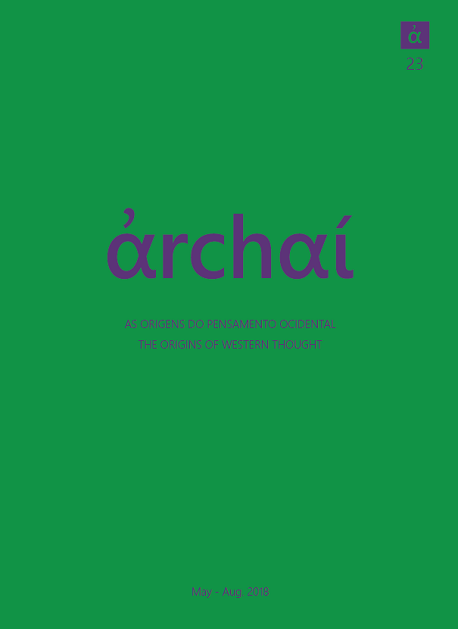Plato's theory of punishment in book IX of Laws
DOI:
https://doi.org/10.14195/1984-249X_23_2Palavras-chave:
Plato, Laws, Punishment, Greek LawResumo
The basis of moral responsibility is the central issue of Book IX of Laws, where Plato develops his theory of punishment, conciliating the Socratic thesis that no one is voluntarily bad (οὐδεὶς ἑκὼν κακοÌÏ‚), with the practical necessity for a gradation of penalties, the latter being derived from the traditional distinction between voluntary and involuntary offences. Distinguishing two independent aspects of crimes ”“ injury (βλάβη) and injustice (ἀδικίÌα) ”“ Plato argues that the former requires only restitution, whereas injustice calls for punishment, conceived as a measure to improve the soul, affected by disordered emotions or ignorance, causes of injustice.
Downloads
Referências
BRISSON, L.; PRADEAU, J. F. (2006). Platon. Les Lois (traduction, introduction et notes). 2 vol. Paris, GF Flammarion.
BURY, R. G. (1926). Plato. Laws (translation). Vol. IX and X. London, New York, Loeb Classical Library.
COHEN, D. (2005a). Theories of Punishment. In: GAGARIN, M.; COHEN, D. (ed.). The Cambridge Companion to Ancient Greek Law. Cambridge, Cambridge Univ. Press, p. 170-190.
COHEN, D. (2005b). Crime, Punishment and the Rule of Law in Classical Athens. In: GAGARIN, M.; COHEN, D. (ed.) The Cambridge Companion to Ancient Greek Law. Cambridge, Cambridge Univ. Press, p. 211-235.
ENGLAND, E. B. (1921) (ed.). The Laws of Plato. 2 vol. Manchester, The University Press.
GAGARIN, M. (2008). Writing Greek Law. Cambridge, Cambridge Univ. Press.
GAGARIN, M. (2011) (ed.). Speechs from Athenian Law. Austin, Univ. of Texas Press.
GÖRGEMANNS, H. (1960). Beiträge zur Interpretation von Plato’s Nomoi. Munchën, Beck.
HACKFORTH, R. (1946). Moral evil and ignorance in Plato’s Ethics. Classical Quartely, 40, p. 118-120.
MACKENZIE, M. M. (1981). Plato on Punishment. Berkeley, Univ. of California Press.
O’BRIEN, M. J. (1957). Plato and the “good conscience”, Laws, 863e5-864b7. Transactions of the American Philological Association, 88, p. 81-87.
ROBERTS, J. (1987). Plato on the causes of wrongdoing in the Laws. Ancient Philosophy, 7, p. 23-37. Also in: IRWIN, T. (ed). Classical Philosophy: collected papers. Vol. 3. Plato’s Ethics. (1995) New York, London, Garland Publishing Inc., p. 397-411.
ROBIN, L. (1950). Platon. Oeuvres Complètes (traduction et notes). 2 vol. Paris, Gallimard.
SAUNDERS, T. J. (1968). The Socratic paradoxes in Plato’s Laws. Hermes, 96 (3), p. 421-434. Also in: IRWIN, T. (ed.) Classical Philosophy: collected papers. Vol. 3. Plato’s Ethics. (1995). New York, London, Garland Publishing Inc., p. 383-396.
SAUNDERS, T. J. (1991). Plato’s Penal Code: Tradition, Controversy and Reform in Greek Penology. Oxford, Clarendon Press.
SHOREY, P. (1926). Book Review. Classical Philology, 23, p. 403-405.
STALLEY, R. F. (1983). An Introduction to Plato’s Laws. Oxford, Basil Blackwell.
TODD, S. C. (2005). Law and Oratory at Athens. In: GAGARIN, M.; COHEN, D. (ed.) The Cambridge Companion to Ancient Greek Law. Cambridge, Cambridge Univ. Press, p. 97-111.
TRELAWNY-CASSITY, L. (2010). Ten Tou Aristou Doxan: On the theory and practice of punishment in Plato’s Laws. Polis, 27, N. 2, p. 222-239.
WEISS, R. (2006). The Socratic Paradoxes and Its Enemies. Chicago, University of Chicago Press.
YUNIS, H. (2005). The Rhetoric of Law in FourthCentury Athens. In: GAGARIN, M.; COHEN, D. (ed.). The Cambridge Companion to Ancient Greek Law. Cambridge, Cambridge Univ. Press, p. 191-210.
Downloads
Publicado
Como Citar
Edição
Seção
Licença
Dado o acesso público desta revista, os textos são de uso gratuito, com obrigatoriedade de reconhecimento da autoria original e da publicação inicial nesta revista. O conteúdo das publicações é de total e exclusiva responsabilidade dos autores.
1. Os autores autorizam a publicação do artigo na revista.
2. Os autores garantem que a contribuição é original, responsabilizando-se inteiramente por seu conteúdo em caso de eventual impugnação por parte de terceiros.
3. Os autores garantem que a contribuição que não está em processo de avaliação em outras revistas.
4. Os autores mantêm os direitos autorais e concedem à revista o direito de primeira publicação, sendo o trabalho licenciado sob a Creative Commons Attribution License-BY.
5. Os autores têm permissão e são estimulados a publicar e distribuir seu trabalho on-line após a publicação na revista.
6. Os autores dos trabalhos aprovados autorizam a revista a, após a publicação, ceder seu conteúdo para reprodução em indexadores de conteúdo, bibliotecas virtuais e similares.
7. É reservado aos editores o direito de proceder ajustes textuais e de adequação do artigo às normas da publicação.



